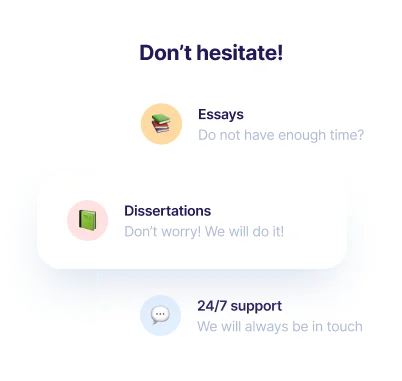Fine Art Dissertation Topics Writing Help
Remember! This is just a sample
You can get your custom paper by one of our expert writers
Get custom essay
Remember! This is just a sample
You can get your custom paper by one of our expert writers
Get custom essay
The great topic idea is, of course, not a half, but at least quarter the battle when it comes to writing a dissertation. Articulated in the right way, the topic can give you a clue to the entire thesis layout or even proposal structure. Take any art dissertation proposal example, and you'll see that to a great extent it is just breaking down the topic and validating every word from the title.
If you are having hard times coming up with a topic for your fine art dissertation, you can resolve the issue by addressing the help of degreed experts in this field. DissertationWritings.com is a perfect place to find yourself a companion who has a Master's or PhD degree, relevant expertise, and the willingness to provide you so much needed assistance. Our authors know how to choose an art dissertation topic inside out and are ready to offer you a wide selection of subjects. While performing this task, they can also share their wisdom on further steps with you.
Now we suggest you have a look at some of the latest themes that our writers have recently advised on:
Fine art and the Internet. Explores the role of fine arts in the online world. How can fine arts be integrated into website development?
Art history and present times. How did various art movements or even single works have influenced the modern state of affairs or lied foundation for current trends?
Concept art. What techniques and methodologies are used to create a concept art piece? How does concept art make its way to advertising?
Video games. Can video games be considered fine art?
Digital film. Is the shift to digital films destroying the cinematic art? Are they genuinely destroying people’s enjoyment of movies?
Audiobooks. Are audiobooks changing the way people appreciate the written art? Will people in the future still be reading in the traditional way?
E-books. What do electronic books mean for the future of literature? Will they put books out of reach by destroying the secondary market?
Podcasting. How podcasts can help to democratize education? How can you disseminate them in areas where there is no Internet connection?
Computer-generated effects. Can motion capture acting be considered genuine acting? Should motion capture actors be considered for awards beside regular actors?
New recording technologies. What do they mean for the future of the performing arts? Will vocal enhancement tools such as AutoTune destroy the art of singing?
Digital video. Is it necessarily a good thing that anybody with a camcorder can make their own movie or will this simply flood distribution channels indiscriminately with content without reference as to whether it is good or bad?
Twitter novels. Can novels written in 140 character bursts ever be considered legitimate literature?
Cinema. What is the future of stars in a cinematic landscape increasingly dominated by franchises?
Theater. What is the role of theater in the entertainment of the XXIst century?
Photography. How did fine art photography come to being? What factors make a photo a piece of art while others are just a piece of colored paper?
Acting. What will a completely convincing computer-generated actor (synthespian) mean for the future of acting?
Art and design. How does classic art impact modern web design? Is design the art at all?
Audiobooks. Will there be books in the future written specifically to be performed as audiobooks? What will this mean for the future of literature?
Art and exact sciences. Can the convergence of art and exact sciences create a universally understood language thanks to Leibniz's concept of the art of combinations?
While inspiration is believed to be the source of art, writing a fine art dissertation comes not only of inspiration but also thorough research and precise planning. Here is a short step-by-step guide meant to answer basic questions about dissertation writing stages:
Choose a topic that you’re genuinely interested in and that you’ll be willing to stick with throughout the long process of dissertation writing.
Research your topic to see if someone else might already be doing it as their dissertation. But even so, you can still use it if you can find a different angle.
Develop the structure of your dissertation and always keep it in front of you while crafting the paper.
Devote most energies to crafting a great abstract, introduction, and conclusion of the dissertation – these are parts that attract the most prominent attention of the committee.
Be creative in the way you present your dissertation. For example, if your topic concerns podcasting, you can create your own podcasts in addition to the written dissertation.
Carefully document the way you produce your dissertation to avoid problems later when you’re defending it.
Create a schedule for completing your dissertation to ensure that you’ll be able to finish it in the time allocated to you. Be sure to set realistic goals.
